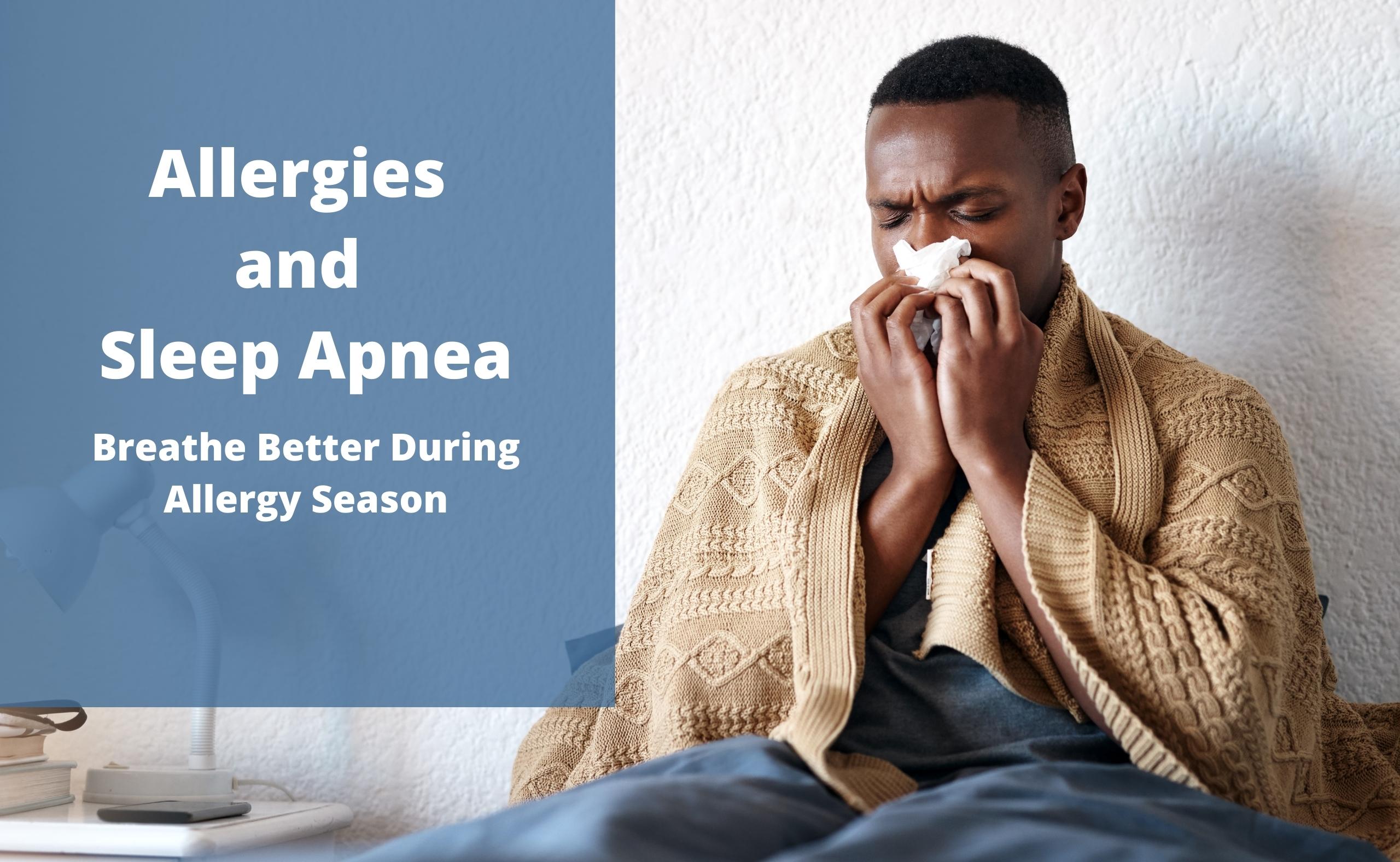Are allergies keeping you up at night? You’re not alone.
Countless people struggle to get a good night’s sleep due to sneezing, itching, and congestion. These symptoms can turn your peaceful slumber into a restless ordeal. Imagine waking up refreshed, without the relentless tug of allergies. Sounds like a dream, right?
Understanding the link between allergies and sleep might be your ticket to better rest. Dive into this eye-opening exploration and discover how you can reclaim your nights and wake up with energy and clarity. Don’t let allergies dictate your sleep—learn how to take control and transform your nights today.
Impact Of Allergies On Sleep
Allergies can significantly affect sleep quality. Many people struggle with disturbed sleep due to allergens. Understanding how allergies impact sleep is crucial. It helps in managing symptoms effectively.
Common Allergens Affecting Sleep
Dust mites are a common sleep disruptor. They thrive in bedding, pillows, and mattresses. Pollen is another sleep-affecting allergen. It can enter homes through open windows and doors. Pet dander also poses a threat to peaceful sleep. Even pets with minimal shedding can cause issues. Mold spores in damp areas can trigger allergies. Bathrooms and basements are prime spots for mold growth.
How Allergies Disrupt Sleep Patterns
Allergens can cause nasal congestion. This makes breathing difficult at night. Congestion can lead to snoring. Snoring disrupts sleep for you and your partner. It can cause frequent waking. Allergies may lead to itchy eyes and skin. Itching can keep you awake. Constant scratching interrupts sleep cycles. Some allergens trigger coughing. Coughing disturbs sleep and leads to fatigue.
Allergic reactions often cause headaches. Headaches can make falling asleep hard. Poor sleep quality results from frequent waking. It leads to daytime drowsiness and lack of focus.

Credit: www.resmed.com
Recognizing Allergy Symptoms
Allergy symptoms can disrupt sleep, causing discomfort and fatigue. Itchy eyes and sneezing at night may indicate allergies. Restless nights might result from nasal congestion or sinus pressure. Identifying these signs helps in managing better sleep and overall health.
Recognizing allergy symptoms can be a game-changer for your sleep quality. Allergies often sneak into your life quietly, but their impact is loud and clear, especially at night. Imagine waking up several times, only to realize that pesky allergens are the culprits behind your restless nights.
Typical Signs Of Allergies
Identifying allergy symptoms can be straightforward if you know what to look for. Sneezing, nasal congestion, and itchy eyes are common indicators. If you notice these signs regularly, especially in specific environments like your bedroom, allergens might be to blame. You might also experience a runny nose or coughing that seems to worsen at night. These symptoms can disrupt your sleep cycle and leave you feeling exhausted the next day. Don’t overlook signs like a scratchy throat or skin irritation; they can also hint at allergies.
Differentiating Allergies From Other Sleep Disorders
Allergy symptoms can mimic other sleep disorders, making it crucial to distinguish between them. While both can cause restless sleep and daytime fatigue, allergies often include nasal symptoms and sneezing. Sleep disorders like sleep apnea might present with loud snoring or breathing interruptions instead. Ask yourself if your symptoms follow a pattern. Do they worsen in certain seasons or locations? If they do, allergies might be the underlying issue rather than a sleep disorder. Consider keeping a symptom diary. Track when and where your symptoms occur. This simple tool can help you and your doctor determine if allergens are affecting your sleep more than you realize. Understanding your body’s signals is essential. Could your sleepless nights be due to allergies? Recognizing these symptoms early can lead you to seek effective solutions and reclaim peaceful sleep.
Natural Remedies For Allergy Relief
Allergies can disrupt sleep and affect daily life. Sneezing, itching, and congestion make restful nights hard. Natural remedies offer a gentler approach to find relief. They help in soothing symptoms and improving sleep quality. Let’s explore some effective solutions.
Herbal Solutions And Supplements
Herbs have been used for centuries to ease allergy symptoms. Butterbur is known to reduce nasal congestion. It’s a natural antihistamine. Stinging nettle can help lower inflammation and ease sneezing. Quercetin, found in supplements, supports the immune system. It reduces histamine release.
Green tea contains antioxidants that may calm allergies. Drink it warm before bed. It can soothe the throat and reduce coughing. Check with a doctor before trying new supplements.
Dietary Adjustments For Better Sleep
Diet plays a role in managing allergies. Avoid foods that trigger symptoms. Some people react to dairy or gluten. Experiment with an elimination diet. See if symptoms improve.
Include foods rich in omega-3 fatty acids. These can reduce inflammation. Fish like salmon or walnuts are good sources. Vitamin C-rich fruits boost the immune system. They help the body fight allergens.
Stay hydrated to keep airways clear. Drink plenty of water throughout the day. Herbal teas can also provide comfort.

Credit: www.sleepcareonline.com
Improving Sleep Environment
Allergies can greatly impact sleep quality, leaving you tired and irritable. Improving your sleep environment is crucial for managing allergies. By creating an allergy-friendly bedroom, you can enjoy better rest and health. Let’s explore practical ways to transform your bedroom into a sanctuary.
Allergy-proofing Your Bedroom
Keep your bedroom clean and clutter-free. Dust and allergens thrive in messy spaces. Regularly vacuum carpets and rugs using a vacuum with a HEPA filter. This traps allergens effectively. Consider removing heavy drapes that collect dust. Opt for washable curtains or blinds instead. Use damp cloths to dust surfaces, as they capture particles better than dry methods.
Ensure windows are closed during high pollen seasons. Install window screens to filter outdoor allergens. This helps maintain a cleaner air environment indoors.
Choosing The Right Bedding And Air Filters
Bedding materials play a key role in allergy management. Choose hypoallergenic pillows and mattress covers. These prevent dust mites from settling in. Wash bedding weekly in hot water. This kills allergens like dust mites. Consider using natural fiber blankets, which are less prone to allergens.
Invest in a high-quality air purifier with a HEPA filter. It cleans the air by removing allergens. Place it in your bedroom for maximum effect. Change air filters regularly to ensure optimal performance.
By making these changes, you create a healthier sleep environment. This reduces allergy symptoms and promotes restful sleep.
Lifestyle Changes For Restful Sleep
Allergies can disrupt your sleep and affect your well-being. Adopting lifestyle changes may improve your sleep quality and help manage allergy symptoms. Simple adjustments in daily routines can create a peaceful sleep environment. Let’s explore a few lifestyle changes that promote restful sleep.
Exercise And Relaxation Techniques
Regular exercise can improve sleep quality. Aim for at least 30 minutes of physical activity each day. Activities like walking, swimming, or cycling can boost energy and mood. Engage in relaxation techniques before bedtime. Deep breathing and gentle stretching calm the mind and body.
Yoga and tai chi offer benefits for sleep. These practices combine physical movement and mental focus. They reduce stress and encourage relaxation. Try gentle poses or stretches in the evening to unwind.
Mindfulness And Stress Reduction
Mindfulness helps reduce stress and improve sleep. It involves focusing on the present moment without judgment. Practice mindfulness with meditation or breathing exercises. A few minutes each day can enhance sleep patterns.
Stress can worsen allergy symptoms and disrupt sleep. Reduce stress with simple activities. Read a book, listen to soothing music, or take a warm bath. These activities help calm the mind and prepare it for sleep.
Develop a bedtime routine that includes mindfulness practices. This routine signals your body that it’s time to rest. Consistency is key. Stick to your schedule for better sleep quality.

Credit: sleepcenterinfo.com
Seeking Professional Help
Struggling with allergies can disrupt sleep and affect well-being. Professional help can identify triggers and offer relief. Expert guidance ensures better sleep quality and improved health.
Dealing with allergies can be a constant battle, especially when they disrupt your sleep. Seeking professional help might seem daunting, but it can make a world of difference in your quality of life. Imagine waking up refreshed, free from the clutches of endless sneezing or a stuffy nose. Professional guidance can help you get there. But when should you reach out, and who should you turn to for help?
When To Consult An Allergist
You might wonder, “Is it time to see an allergist?” If your allergies are keeping you awake at night, affecting your daily routine, or if over-the-counter medications aren’t working, it’s time to seek help. An allergist can identify specific triggers and provide a tailored treatment plan. This could involve allergy testing or prescribing medication that is more effective for your condition. Don’t wait until your symptoms are unbearable. Early intervention can prevent complications and improve sleep quality.
Sleep Specialists And Treatment Options
If allergies are impacting your sleep, consulting a sleep specialist might be a wise move. They can pinpoint how allergies are affecting your sleep cycles and suggest targeted solutions. Treatment options may include Continuous Positive Airway Pressure (CPAP) therapy for those with sleep apnea, or cognitive behavioral therapy if anxiety around allergies is keeping you awake. Consider discussing both short-term and long-term strategies with your sleep specialist. What small changes can you make now that will lead to restful nights? Remember, you deserve restful sleep and a life that’s not dictated by allergies. Seeking professional help is a proactive step towards reclaiming your nights and improving your overall well-being.
Frequently Asked Questions
How Do Allergies Affect Sleep Quality?
Allergies can lead to nasal congestion and sneezing, disrupting sleep. It might cause frequent awakenings at night. This can result in feeling tired and groggy the next day. Addressing allergy symptoms can help improve sleep quality significantly.
Can Allergy Medications Improve Sleep?
Yes, certain allergy medications can improve sleep by reducing symptoms. Antihistamines, for instance, can relieve nasal congestion and itching. However, some may cause drowsiness, while others might disrupt sleep. Consulting a doctor for suitable medication is advisable.
What Are Common Allergens That Disrupt Sleep?
Common allergens include pollen, dust mites, pet dander, and mold. These allergens can trigger nasal congestion and sneezing. This can lead to poor sleep quality. Identifying and minimizing exposure to these allergens can help improve sleep.
How Can I Create An Allergy-free Bedroom?
To create an allergy-free bedroom, use hypoallergenic bedding. Regularly clean and vacuum to remove dust and pet dander. Consider using an air purifier to reduce allergens. Keeping windows closed during high pollen seasons can also help.
Conclusion
Sleep quality matters, especially for allergy sufferers. Allergies can disrupt your restful nights. Sneezing, itching, and congestion make sleep difficult. But don’t lose hope. You can improve sleep with a few steps. Keep your bedroom clean. Use air purifiers for fresher air.
Choose hypoallergenic bedding to reduce irritants. Consider allergy medication if necessary. Small changes lead to better sleep. You’ll wake up refreshed and energized. Sleep well, breathe easy, and tackle the day with confidence. Address allergies and enjoy peaceful nights. Sleep is essential for health.
Prioritize it every night.
